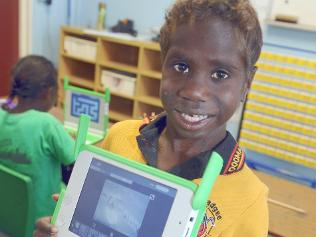With the learning landscape rapidly changing to embrace the emerging participatory culture, shouldn't every child have access to technological devices that enable them to be become active informed, equal citizens of the future?
Even remote indigenous communities are getting access to mobile devices, to transform their learning.
This article draws attention to the changes in attendance and motivation of young children in a remote indigenous community in far north-west Queensland after small durable laptops where donated to the school. The global charity organisation One Laptop per Child (OLPC)has issued 120 purpose built laptops to Doomadgee State School, a particularly remote area in the Gulf of Carpentaria. The mission of the charity is to globally introduce mobile media laptops to enthuse some of the poorest, most disadvantaged children from around the world with a device that will not only provide an innovative means of learning, but the same media making, gaming and multimedia opportunities as their city counterparts. In order to ensure these low cost, small, portable devices are able to withstand the adverse environmental conditions in which they will be used, they have been adapted for rugged use in bright sun, use little power, have a rubber keyboard and have the potential for wireless internet access.
The philosophy behind providing such tools to enable the students to be able to use technology, despite their isolation and impoverished environment is honourable and will be useful in creating improved literacy, problem solving and critical thinking skills, which are fundamental skills for participation in the 21st century. As the principal, Richard Barry notes, enthusiasm, motivation and an 8 per cent increase in attendance at school and for learning has occurred since the arrival of the laptops. This can only be seen as a positive in reducing the participation gap that exists for these remote indigenous communities.
Whilst these laptops provide advantages for learning that extend beyond the current facilities at the school, they will also create opportunities for learning basic computer skills. However due to the lack of broadband access currently available in remote outback Australia, these hand held computers could be seen by the students predominately as gaming and entertainment devices. It will take good pedagogical practices by educators in this school to develop the student's desire to move beyond the entertainment factor of these “first generation” devices. Once broadband is introduced and providing the student's are taught how to navigate the digital world to personalise their learning, the value of mobile devices in having ubiquitous access to information could transform their learning could be despite the remoteness of their location.
Elka, S. (2010) Looking to laptops to lead Doomadgee children out of poverty. The Australian September 11th 2010.


Comment by Karin.
ReplyDeleteI think it is fantastic that a global charity organisation has donated durable laptops to schools in remote communities. I understand the philosophy behind the decision but I also believe that solid teaching pedagogies are vital to the success of the program. It is important that students don’t solely view the laptops as a means for entertainment but also realise the educational benefits for their future.
It is unfortunate that broadband access is currently unavailable as I feel this drastically limits the laptops potential. I believe this is a common problem experienced in schools. Schools are keen to advance but sometimes do so without seamless efficiency. At times, the technology isn’t compatible with other technology at the school or the server can’t support the number of students trying to access information at one time.
I hope the students in Doomadgee don’t gain a false understanding of the potential of computers. It is vital that they remain interested in them when broadband finally becomes available. I also hope the laptops are still working when that time comes. I believe that in order to ensure that ‘every child has access to technological devices that enable them to become active informed equal citizens of the future,’ the government must also provide access to broadband so the technological devices can be used to their potential.
This comment has been removed by the author.
ReplyDeleteA program such as 'One laptop per child' has enormous educational merit for Doomadgee School Children however the practicalities have to be addressed. It is wonderful that these children were provided with laptops but clearly they are not being used to their full potential due to limited or lack of internet access.
ReplyDeleteIn my research for this subject area, I have discovered how ‘Educators are finding innovative ways to bring education to students in remote areas.’ (Davis, 2010). Many school-age children across Africa don’t have access to a formal education. This is for a variety of reasons including their isolated location, a need to work or living in a life threatening situation. Officials have discovered that it is much cheaper to access mobile technology through a mobile phone tower than it is to install fibre optic or wire connectivity to villages. Africa is the continent with the fastest growing mobile phone use and so it makes sense to tap into this educational potential. In Africa, Davis(2010) reports that mobile phones have been used to: access lesson plans which have been uploaded to blog sites; provide teachers with online resources and professional development; access online social networking games such as 'Evoke' (World Bank, 2010).
It could be said that developed countries might need to take lessons from developing countries in their effective use of mobile devices.
References:
Davis. (2010). Devices Deliver Learning in Africa: Educators are finding innovative ways to bring education to students in remote areas using cellphones, laptops, and MP3 players. Education Week , 29 (26), 32-33.